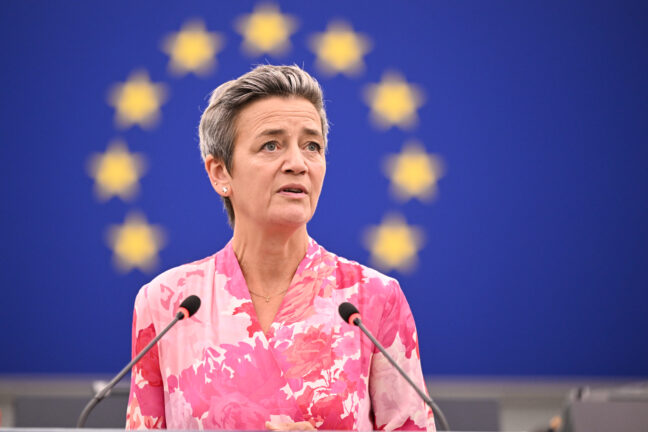The European Union’s effort to rein in big Tech scores an important—if partial—victory as a ranking adviser to the European Court of Justice says regulators are right to punish Google for abusing the market power of Android, its operating system.
Advocate General Juliane Kokott of the EU’s Court of Justice stated in a non-binding opinion published on Thursday that Google’s appeal against a €4.12bn fine should fail. She argued that the legal arguments presented by the US tech giant were insufficient.
Ms Kokott noted that Google maintained a dominant position in several markets within the Android ecosystem. This dominance provided network effects that ensured users chose Google Search. Consequently, Google gained access to valuable data, which allowed it to enhance its services.
Android under threat
Google expressed disappointment with the opinion, asserting that a ruling in line with it would deter investment and negatively impact Android users. The European Commission, asked by Bloomberg, declined comment.
The fine imposed on Google regarding its Android practices was originally set at €4.3bn but was slightly reduced by the EU’s General Court in 2022.
You might be interested
The final decision from the top EU court could significantly influence the future of the Android business model, which relies on offering free software while imposing specific conditions on mobile phone manufacturers. The European Commission first raised concerns in 2018, accusing Alphabet Inc.’s Google of three types of illegal conduct that reinforced its search engine’s dominance, along with issuing a record fine.
Transatlantic tensions
The Commission claimed that Google unlawfully required handset manufacturers to pre-install the Google Search app and Chrome browser as a condition for licensing its Play Store. Furthermore, it alleged that Google incentivised certain manufacturers and operators to exclusively pre-install the Google Search app. Finally, it stated that Google hindered manufacturers from installing alternative versions of Android not sanctioned by the company.
This penalty is part of a broader series of EU fines aimed at regulating Big Tech. The antitrust probes exemplified signature policies of the then-Commissioner Margrethe Vestager (Renew/DEN).
While they helped the European Union assume the mantle of global tech regulator-in-chief, they did not win Brussels many friends overseas. Tensions between EU regulators and Silicon Valley have since been palpable. Former—and current—US President Donald Trump criticised the resulting fines, characterising them (as he would) as tariffs on American companies.
Battle on many fronts
In September 2022, the General Court largely upheld the Commission’s findings but reduced the fine after determining that regulators lacked sufficient evidence to support claims of specific abuses. During the appeal hearing in January, Google’s lawyers contended that the company’s success stemmed from innovation, not coercive practices. They claimed the EU was penalising Google for its superior quality and innovation.
Google held a dominant position in several markets of the Android ecosystem and thus benefited from network effects that enabled it to ensure that users used Google Search. Juliane Kokott, Advocate General of the EU Court of Justice
In addition to traditional antitrust concerns, Google faces scrutiny under the EU’s Digital Markets Act, which places stringent regulations on the conduct of Big Tech firms.
In March, the European Commission reprimanded Google for allegedly violating this regulation by preferentially promoting its own services within its extensive search ecosystem and restricting app developers from directing users to alternative offers outside its Play Store. This warning could lead to additional fines in the future.
Shaping future policies
As Advocate General, Ms Kokott provides independent legal opinions that assist the Court in its decision-making process. While these opinions are not binding, they offer valuable insights and analyses of legal issues. The legal community often regards the opinions of Advocates General as authoritative. This perception enhances the weight their opinions carry among practitioners, scholars, and policymakers.
It is not common for the Court to adopt the Advocate General’s advice, lending considerable weight to their opinions in shaping case law. This process leads to the setting of precedents; this, in turn, helps to create a level of consistency in judicial proceedings across the EU. The opinions thus play a crucial role in the development and clarification of EU law. Therefore, they are instrumental in the shaping of the bloc’s future policies.
In this particular case, however, even the final ruling will not bring about groundbreaking changes. Since the lawsuit took off, the EU has adopted legislation that clearly prevents Google from some of the behaviours which are now likely to become illegal. What it does is more subtle: by flexing its legal muscle, the Union signals its will to stand up to Big Tech. That may be useful—either in and of itself, or as a bargaining chip during upcoming negotiations with Washington on an array of matters ranging from trade to defence.
Vestager’s legacy
Before being replaced as the EU’s antitrust commissioner by Teresa Ribera (S&D/ES), Ms Vestager fined Google more than €8bn. That also echoed the US Department of Justice’s suggestion that Google’s advertising technology business should be broken up, a position also backed by Ms Ribera today.
The Android case was one of four that formed the centerpiece of Ms Vestager’s efforts. Today’s Advocate General’s opinion helps cement her legacy as a tech regulation trailblazer.











